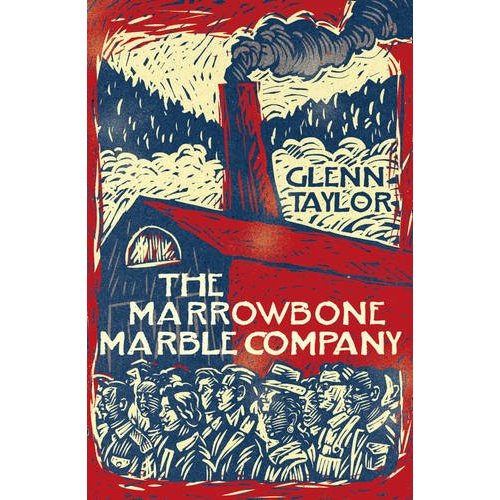by Glenn Taylor.
Review by Nick Small.
A few weeks ago I mentioned to Jeff that I’d just watched Rich Hall’s superb television programme “The Dirty South”. I related that I had learned more about The South in that 90 minutes than during a three year American Studies degree course. I suspect this may be why he sent me “The Marrowbone Marble Company”.
Glenn Taylor’s second book is a historical novel set largely in West Virginia and spanning the turbulent time from the onset of the war in the Pacific to the late 60s, when the civil rights movement, anti-Vietnam radicalism, hippy culture and the Summer of Love were punctuated by the death of Martin Luther King.
Loyal Ledford is a man apart, an existential hero who lost his family in a car crash leaving him to carve his own way through a world of brutality, mortality, injustice and in your face racism. Sweating at the furnace of a glass factory by day, and courting the owner’s daughter by night, he finds that he exists in a world where good black men clean the floors, women know their place and the fat-cat factory owner cuts a distasteful Boss Hogg figure. This tension is cut by the attack on Pearl Harbour, upon which Ledford leaves to fight in the South Pacific.
Fighting the Japanese at Guadalcanal in the Solomon Islands, amongst scenes of inconceivable horror, Ledford forms a key friendship with a hard drinking, fighting, gambling gangster to be, Erm. Together they negotiate “what has to be done” knowing that what they have witnessed will inform their entire lives, without them ever being able to talk about it. Glenn Taylor’s direct and unflinching prose captures the matter of fact brutality of this war almost too perfectly. It isn’t a comfortable passage to read, and nor should it be.
Returning to his sweetheart Rachel and a desk job at the glass factory, Ledford soon realises that he cannot accept the life mapped out for him. His second key friendship is struck up with Don Staples, a philosophy academic, a theologian and civil rights campaigner. His education stirs in him a longing to do what he knows is right, so as the “rugged individual” archetype tends to do in American popular culture, he takes on the odds to do things “his way”.
He pitches up on the doorstep of his cousins the Bonecutter brothers, lawless mountain men of latent violence, who have a wild and mythical plot of land: Marrowbone Cut. Here, Ledford carves his narrative from the landscape, bringing in his close friends, black, white, waifs, strays and, under the ethical guidance of Don Staples, builds a factory to make glass marbles. Renouncing violent means, he attempts to end a feud with the Bonecutters’ neighbours and sworn enemies the Maynards.
With the Marrowbone Marble Company becoming a successful concern, run on a co-operative basis, with black and white existing together in harmony, the tension is built with the outside world. Racist rednecks, racist corrupt politicians and lawmen, racist media and the wider racist public do not share Ledford’s utopian ideals, and this is where much of the narrative tension arises. To them they are commie, hippy agitators, un-Americans who must be stopped. Throughout the novel there are omens of foreboding: a mischievous Redbird and plagues of Cicadas give notice that the universe is about to rebel.
Meanwhile, marbles are churned out and marbles are played in a pastoral idyll…although the game appears to have little in common with the one I played on the diamond dimpled surface of manhole covers as a child.
As the civil rights movement gathers momentum, the reactionary forces assemble for the ultimate showdown. When Ledford’s son Orb is almost killed by the most vile of the Maynards and Rachel’s corrupt, slimy, greedy, cousin Charlie, Ledford reaches the end of his tolerance. His pacifist guide Don Staples dies, Martin Luther King dies, and with them dies the age of innocence. Habitual killer Erm arrives and so, inevitably, the forces of good and evil collide in a violent finale. Ledford follows in a long tradition of American heroes, a tradition born on the frontier of the Wild West: when push comes to shove he will “do what a man’s gotta do”.
Glenn Taylor tells the story with seemingly effortless skill, in a style that is as much redolent of Camus as the great Southern writers Steinbeck and Faulkner, with whom obvious comparisons will be made. He writes with matter of fact economy, revealing the complexities of character through the gradual observation of their actions, rather than by detailed exposition. Ledford is no one dimensional hero, being capable of knocking back the Ten High whiskey and delivering a face breaking punch with one hand, whilst tenderly caressing the forehead of his son with the other. The direct, colloquial writing is easily engaging, so it isn’t a book that requires much effort to get on with, once the horrors of war have been dealt with anyway. Those who read Glenn’s vivid CBTR piece on Pinks Hot Dogs recently will probably have some inkling as to how he might describe what happens when munitions meet human flesh. I know that doesn’t sound like a recommendation, but it really is.
Copies of The Marrowbone Marble Company are now on sale in the Caught by the River shop, priced £10.99.
We also have copies of Glenn Taylor’s great first novel, The Ballad of Trenchmouth Taggart, on sale in the shop, priced just £5.50.
